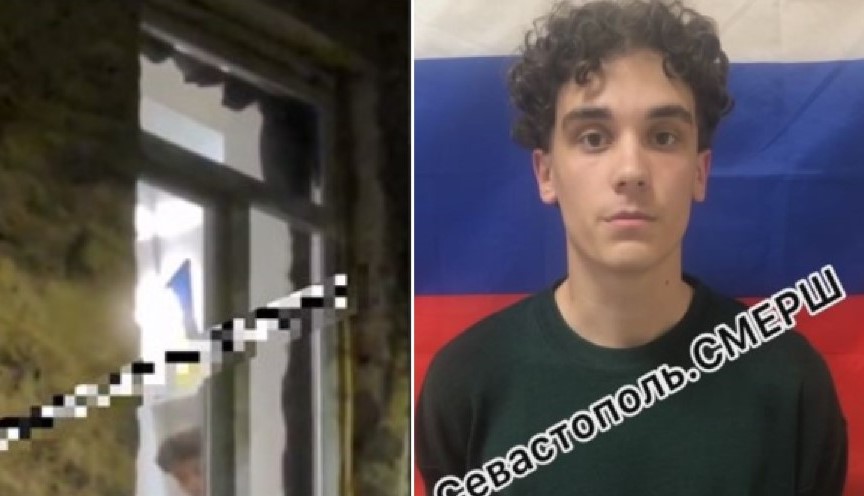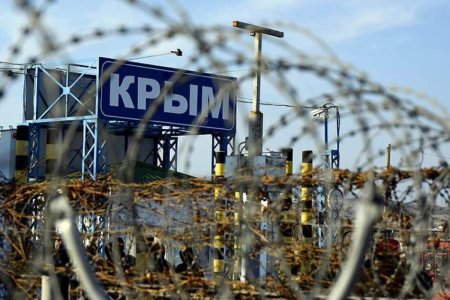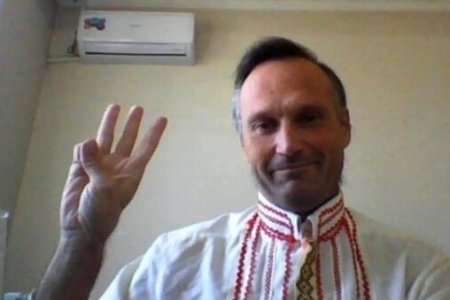
The Russian occupation authorities in Sevastopol have used torture or threats to extract a videoed ‘apology’ from 19-year-old Kyrylo Kolomiyets for the Ukrainian flag he hung in his room. The young Ukrainian student from Mariupol is the latest victim to have been denounced merely for flying the Ukrainian flag or singing Ukrainian songs by Aleksandr Talipov, a pro-Kremlin Crimean blogger. The latter appears to work very closely with Russia’s FSB, with his posting of people’s personal data and denunciations resulting within a day or two in administrative or criminal charges against those he targets. In this case, Kolomiyets’ ‘apology’ appeared on 13 April, a day after Talipov posted a video on his Telegram channel ‘Sevastopol – SMERSH’, seemingly shot in the evening and simply showing the Ukrainian flag in what is presumably the young man’s room.
Videoed ‘apologies’ and ‘confessions’ have become standard since Russia invaded and annexed Crimea. In the vast majority of cases where people have made such ‘confessions’ while in custody and without an independent lawyer, they have later said that they were tortured or threatened into giving them. The manner in which Kolomiyets speaks and his words about “western propaganda” make it near certain that some form of duress was used to extract this ‘apology’.
Staring at the camera, and appearing to read a memorized text, Kolomiyets says: “I, Kyrylo Olehovych Kolomiyets, came to Sevastopol from Mariupol. I was met very warmly in the city, helped and supported in every way and helped to enter university. However, under the influence of western propaganda which poisoned my mind for 19 years, I placed a Ukrainian symbol, namely the flag, on the wall in my room. In this way I spat in the face of all the people who had supported me. I ask for forgiveness and repent, and promise it will not happen again.”.
Such a forced ‘apology’ for the flag of his country is most shocking given that Kyrylo has clearly arrived recently from Mariupol. Whether he came voluntarily or was effectively deported to occupied Sevastopol, he left because of the devastation and carnage Russia used to gain control of this Ukrainian city.
It has been dangerous since 2014 to publicly fly or hold a Ukrainian flag, however the level of persecution and absurd pretexts for prosecution increased sharply following Russia’s full-scale invasion of Ukraine. A large number of Ukrainians in Crimea have faced administrative or even criminal charges, usually under the repressive legislation rushed through after the full-scale invasion. Many have been heavily fined or received terms of administrative arrest on insane charges of ‘discrediting the Russian armed forces’ by playing a Ukrainian song or even Ukraine’s national anthem.
In August 2022, disk jockey Yury Rodionov was jailed for ten days for playing a Ukrainian song, with video accompaniment showing Ukrainian soldiers and symbols. The person who had asked for the song, Dmytro Hain was fined for supposed ‘actions aimed at discrediting the Russian armed forces’ [Article 20.3.3 of Russia’s code of administrative offences.] Rodionov was seemingly charged under Article 20.3 of this same code which punishes for what is claimed to be ‘propaganda or public demonstration’ either of Nazi symbols, etc. or of those from what the current Russian regime calls ‘extremist organizations’,, or of symbols otherwise prohibited by Russian legislation. The video accompanying the song showed a Ukrainian trident, a Ukrainian woman with an anti-tank Javelin missile and soldiers against the background of the Ukrainian flag. The police claimed that the video footage had symbols of the “Azov nationalist organization” and that there were “anti-Russian slogans” in the song. On that occasion, three people were forced to provide videos demonstrating ‘repentance’: Rodionov, Hain and Halyna Shchytova, the owner of the bar.
In September, at least four members of the two families directly involved in a Crimean Tatar wedding in Bakhchysarai were failed for playing a Ukrainian patriotic song ‘Chervona Kalyna’ [‘Red Kalyna, or Vibernum’] at the wedding, while others were fined (details here).
In early October, a Crimean beauty queen was fined and her friend was jaled for singing that same song.
Talipov was certainly involved in seeking the persecution over the song at a Crimean Tatar wedding, and over the initially administrative charges, and then criminal prosecution of Andriy Bielozierov.
Talipov also seems to have been behind the prosecution and large fine against 20-year-old Evelina Memetova for posting Ukraine’s national anthem on her social media page. It was claimed that “through this, she carried out public actions aimed at discrediting the use of the armed forces of the Russian Federation for the purpose of defending the interests of the Russian Federation and its citizens, of defending international peace and security within the framework of the demilitarization and denazification of Ukraine” (more details here).



